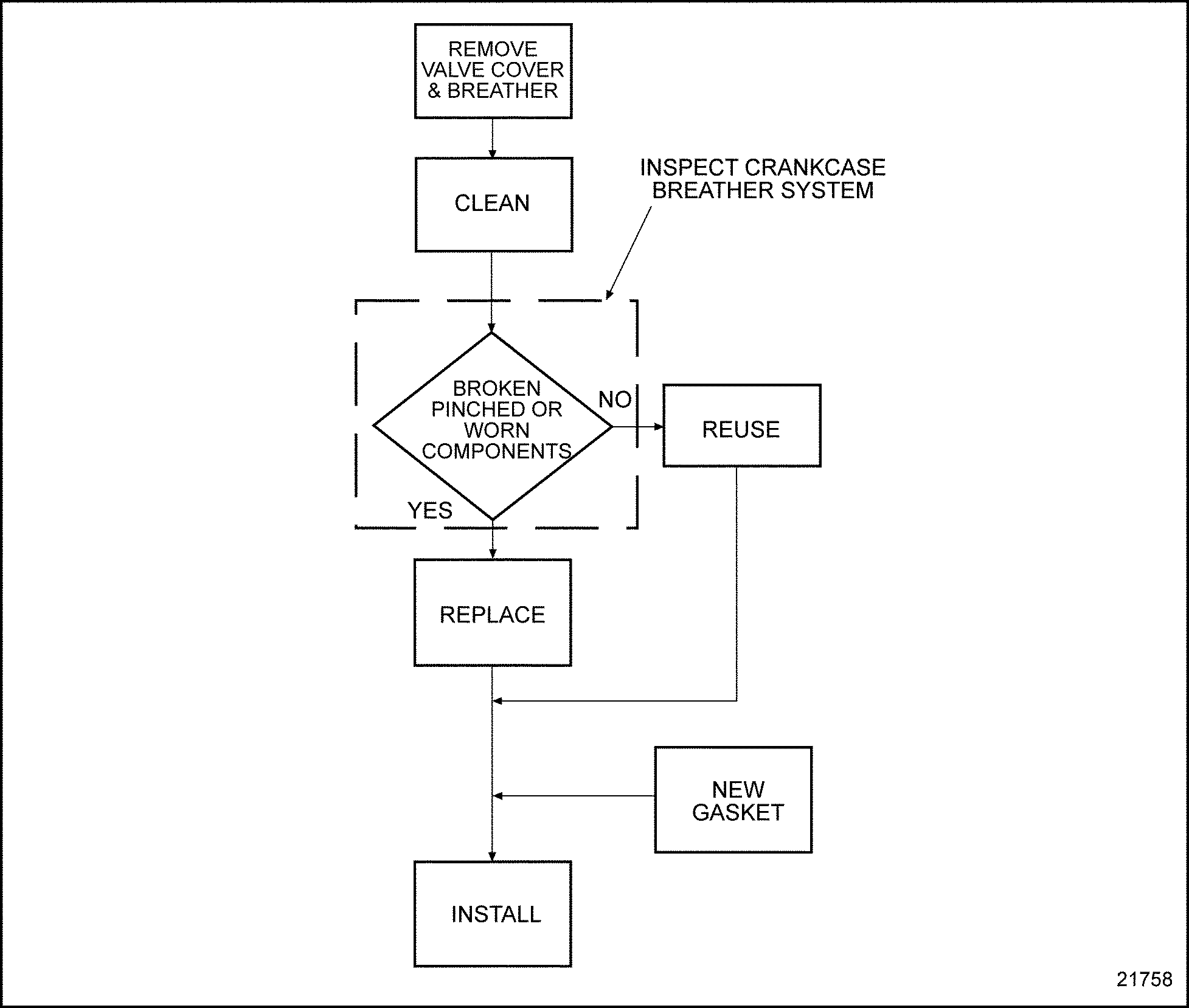Section 3.10
Ventilating System
Vapors, formed within the engine, are removed from the crankcase, gear train and valve compartment by a continuous pressurized ventilating system.
A slight pressure is maintained in the engine crankcase by the normal seepage of a small amount of air and combustion gases past the piston rings. These gases are swept up through the engine and pass through a crankcase breather. The gases are then vented to the atmosphere.
Breather extension hoses may be required on certain Series 50 engines used in on-highway vehicle applications.
Under certain conditions, the vapors from an operating engine may be circulated through the battery charging alternator by the alternator cooling fan. Excessive ingestion of vapors may lead to alternator malfunction. This can occur if the internal components of the alternator become coated with oil-laden dust or road grit.
To minimize the potential for this condition, check the length of the engine breather tube and add an extension hose, if necessary. For proper dissipation of vapors, the end of the breather hose must extend at least twelve inches below the oil pan rail.
Note: The S50G automotive engine uses a closed crankcase breather system. Refer to "6.4 Closed Crankcase Breather for S50g Automotive Engines (1998 and Later)" for more information.
A wire mesh element is located inside the valve cover, or in a separate housing on the valve cover cap or at the gear case cover. This element traps excess engine oil particles in the vapor and returns them to the crankcase. See Figure "Wire Mesh Elements" .

|
1. Wire Mesh Element |
5. Valve Cover Cap |
|
2. Retainer |
6. Seal |
|
3. Screw |
7. Breather Housing |
|
4. Baffle |
|
Figure 1. Wire Mesh Elements
A new baffle (23515095) has been added to the breather assembly on the two-piece, low profile aluminum valve rocker cover used on Series 50 engines. This change went into production on June 29, 1993, effective with unit serial number 04R001729. The change was also made to unit 04R001001 (built June 5, 1993) on a single engine pre-production basis.
The new baffle redirects oil splash from the rocker arms, preventing oil from contaminating the breather element. See Figure "Breather Component Location" . Oil trapped in the breather medium can drip out of the breather tube and may cause faulty high crankcase pressure readings.

|
1. Retainer Clip |
5. Breather Housing |
|
2. Wire Mesh Element |
6. Bolt |
|
3. Rocker Cover |
7. Baffle |
|
4. Retainer |
8. Valve Cover Cap |
|
|
9. Seal |
Figure 2. Breather Component Location
Section 3.10.1
Repair or Replacement of Ventilating System
To determine if repair is possible or replacement is necessary, perform the following procedure. See Figure "Flowchart for Repair or Replacement of Ventilating System" .

Figure 3. Flowchart for Repair or Replacement of Ventilating System
Section 3.10.2
Removal of Ventilating System
Precleaning is not necessary.
Remove ventilating system as follows:
- The two-piece low profile valve rocker cover cap has a removable breather housing. Remove as follows:
- Remove the valve cover. Refer to "1.6.2 Cleaning and Removing of Two-piece Rocker Cover-Diesel Engines Only" .
- Remove the three screws, baffle and retainer that retains the breather housing.
- Remove the breather housing, seal, and wire mesh element.
- If the engine is equipped with a gear case cover breather, remove as follows:
- Remove the 5 bolts that secure the breather-oil fill housing to the gear case cover. See Figure "Breather-Oil Fill Tightening Sequence" .
- Remove the 3 screws that secure the retainer to the housing. See Figure "Breather-Oil Fill Housing" .
- Remove the retainer and wire mesh element from the breather housing.

Figure 4. Breather-Oil Fill Tightening Sequence

1. Breather Housing
4. Retainer Bolts
2. Wire Mesh Element
5. Housing Bolts
3. Retainer
Figure 5. Breather-Oil Fill Housing
Section 3.10.2.1
Inspection of Ventilating System
Clean the wire mesh element components prior to inspection as follows:
- Wash the components in clean fuel oil.

EYE INJURY
To avoid injury from flying debris when using compressed air, wear adequate eye protection (face shield or safety goggles) and do not exceed 276 kPa (40 psi) air pressure.
- Blow dry with compressed air.
- Clean all old gasket material from the mating surfaces of the breather-oil fill housing and the gear case cover.
Inspect the ventilating system as follows:
- Inspect the ventilating system for damaged parts.
- Check components for pinched, broken, worn, and unclean parts.
- If any components are damaged, replace with new parts.
Section 3.10.3
Installation of Ventilating System
Install the ventilating system as follows:
- Install the gear case cover mounted breather as follows:
- Install the wire mesh element in breather housing.
- Install the 3 screws and retainer to breather housing. Torque the screws to 2.5 N·m (22 lb· in.).
- Install new gasket, between the breather/oil fill housing and the gear case cover. Torque the five bolts to 30-38 N·m (22-28 lb·ft) using the proper tightening sequence. See Figure "Breather-Oil Fill Tightening Sequence" .
Note: Do not leave gaps around the edges.
- Install the valve cover mounted breather as follows:
- Install wire mesh element in valve cover.
- Install retaining clip in valve cover by engaging curved end in valve cover and then engaging straight end.
- Place the baffle on the retainer with 3 flat bolting flanges against the retainer.
- Install the 3 screws into baffle and torque to 2.5 N·m (22 lb· in.).
- Install seal and breather housing in valve cover.
Note: The baffle must be installed with bolting flanges against the retainer to permit proper engine breathing.
- Install valve covers. Refer to "1.6.6 Pre-installation of Rocker Cover Base" .
| Series 50 Service Manual - 6SE50 |
| Generated on 10-13-2008 |